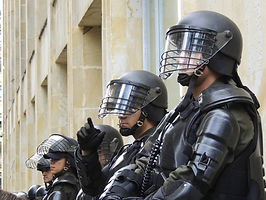
Military and Police Roleplay

It is one of the common training method amongst military branches in which quick decision making is extremely valued.
RPS recognise how to use roleplay to help teams and individuals become more successful. With our team of professional actors trained in providing emotional realism which changes perspectives, RPS provides training with transformative results.
We are able to provide training support to the Army and Police. The main benefit of our experiential learning is that it provides the student with a secure place to try, fail and then prosper. These real-time, energetic experiences generate an extraordinary learning experience.
By acting out on different scenarios, students and employers can discover ways in which other individuals are expected to react to changed methods; and they can get an impression for methods that are expected to work, and for those which might be unfavourable.
Our actors work with your trainers and the character brief, offering a safe simulated situation for your delegates to practice. We can help to recognise where there are learning and development needs or just to support current practices. Either way, using RPS roleplay actors as part of your training courses will add a collaborating element, making your training more engaging, more entertaining, more dynamic and eventually more effective.
Please see below details of types of scenarios our actors are experienced with for both Military and Police training simulations.
Military Scenarios:

-
Media training as a news reporter and role-playing war scenarios giving live updates and information via the news.
-
Roleplays for the army Visiting Officer training, playing grieving fathers of deceased soldiers.
-
Various ones including emotional intelligence and challenging conversations. PTSD, bullying and discrimination.
-
Anti-terrorism and fighting training scenarios.
-
Military role plays scenarios for Home Office, testing whether cameras can pick up weapon attacks in different locations (waiting rooms, crowds, cafes etc)
-
Playing people of varying ranks and experience, often with personal problems such as dyslexia that hasn't been diagnosed, an addiction of some kind, being bullied, having seen a friend be killed etc... all amounting to poor performance. The person being tested/assessed/trained has to drill down, signpost and ultimately show empathy.
Police Scenarios:

-
Playing victims of assault/abuse/rape in interview situations.
-
Playing a witness to a crime.
-
Vulnerable children scenarios.
-
Young offenders who have been detained in cells overnight, been arrested for questioning or who are doing a sentence.
-
Suspects in cases involving theft, robbery, terrorism and various others.
-
Shooter scenarios where someone is randomly shooting people or attacking with a knife.
-
Carrying a concealed weapon and being body searched.
-
Reporting harassment with the harasser present.
-
Situations where there is a threat of suicide and the officer has to talk them 'down'.
-
Diversity Training, Informant Training, Fraud Cases, Detective and Inspector training.